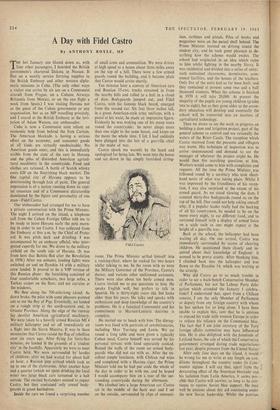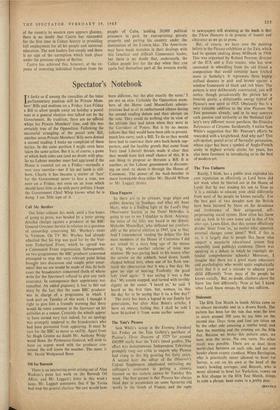If the half-million pounds recently spent on a painting by
Cezanne had been spent with discernment a few decades ago, they would have made Great Britain the possessor of a superlative collection of the modern masters, instead— among the major industrial nations—of one of the poorest. If people had looked care- fully and dispassionately, unintimidated by the prevailing prejudice against the new, at the work of the masters I have named, a certain number would not have been blind to their merit. And if today people looked in a similar spirit, unin- timidated by the prejudice in favour of the new, a certain number of them would be able to dis- tinguish the wheat from the chaff. It is, of course, never easy—especially where the new and unfamiliar are concerned—to judge perceptively. But, for someone who is determined to find it, the evidence is always there, often difficult to discern, but there all the same. Many people are diffident about bringing their judgment to bear, especially where works of art are concerned, supposing judgments to be mere matters of opinion. But the transcendent qualities of a Michelangelo or a Rembrandt, a Homer or a Shakespeare, are not matters of. opinion : they are luminous' facts. The qualities of lesser men do not shine so brilliantly, but they are percep- tible to the inquiring, independent spirit.
I do not for a moment suggest that the exer- cise of objective, independent judgment is ever other than difficult—whether about works of art or any other issues—and there has been no time, within recent centuries at least, when its exercise has been more difficult than it is at present, and there is every prospect of its becoming more difficult still. One of my reasons for believing this to be the case is grounded on observation of certain social tendencies most conspicuous, among western nations, in the United States. One circumstance always enhances, for me, the fascination of a visit to America: this is the pre- view that it affords of social developments to come in Europe. I intend this observation to convey neither praise nor denigration, but simply to em- phasise that, for good or ill, in fact for good and ill, the US is the pace-setter for the western world in innumerable fields of human endeavour. Higher education on a scale as yet only dreamed of here, large-scale co-education, nylon stock- ings, all the range of plastics, automation in the kitchen, 'sick' humour, pdp art—all of these originated in the US, and anyone could extend the list.
Many of these innovations are amenities that vastly enhance the act of living, but there is one tendency in American life that should be a cause for the utmost concern—which, indeed, it already is to many Americans. I have in mind the techniques devised for the manipulation of
opinion and their ruthless exploitation. Advertis- ing—I use the term in *its widest sense—marked
by an extraordinary drive and ingenuity, is able to penetrate the home and exert an influence over private life in general to a degree as yet scarcely imaginable in Europe. The activities of the 'hidden persuaders,' the pressures exerted by the users of these techniques, have succeeded in creating very large areas of conformist opinion and, what is worse, a widespread desire to con- form. There are, of course, certain circumstances in the American social structure that make, or at least have made, in the recent past, a larger measure of conformity than would be the case in Europe a matter of sheer necessity. The US absorbed, by the million, immigrants infinitely various in race, language and education, and in order to bring a cohesive society into being, some degree of conformity had inevitably to be incul- cated. This, too, the sheer size of the country required. But we in Britain should not for a moment allow such particular circumstances of the past to blind us to the dangers of manipulated public_ opinion in the present.
It is significant that when one of our own political parties is in need of renovation more is heard about the need to 'improve its image' than about the need to rethink its policies. Both here and in the US there is an increasing con- cern with 'the image,' that is to say, with how things seem rather than with how they really are. The vast proliferation of public relations firms testifies to this concern. The danger is that firms of this kind, whose services are originally engaged to project policies, may end by modify- ing them to suit the interest of 'audience appeal.'
There is a sense in which the occult manipu- lation of opinion in a democracy may be more insidious than its manifest manipulation by rigorous censorship, the prevention by jamming of broadcasts from outside, and the like, that is a feature, perhaps a necessary feature, of single- party states. For in such states the educated, at least, are aware of the pressures and circum- scriptions they are subject to. They may dis- approve of them, or they may regard them as political necessities, but they are aware, clearly or vaguely as the case may be, that there are
A YEAR'S SUBSCRIPTION to the `Spectaior costs £3 Ss. (including postage) by surface mail to any address in the world.
OVERSEAS AIR MAIL RATES: £4 12s. to Europe, North Africa. and Middle East; SS 10s. to South Africa, East Africa, West Africa, USA, South America, Canada, West Indies, Malaysia, India, and Pakistan; £6 to Australia, New Zealand, China, Japan, and all Pacific islands.
PLEASE SEND ORDERS to The Publisher, •99 Gower Street, London, WCI,
truths beyond, even inconsistent with, officially promulgated doctrine. Doctrines of whatever sort are very imprecise formulations of the truths that they are designed to communicate or express. A comprehensive and coherent com- plex of them—a rigid official ideology, that is to say—is likely sooner or later to foster posi- tive scepticism. In Russia today, for instance, there is always current a vast repertory of stories whose point is precisely such a derisive scepticism. One example may be familiar to you. At a time when the Soviet press was claiming Russian priority in various fields, a story went round Moscow: 'Adam and Eve were Soviet citizens, obviously,' it ran. 'No clothes, only an apple between them, and they believed them- selves in paradise.'
The dangers to the exercise of objective and independent judgment in a free society can be more insidious, because the victim of 'the hidden persuaders' is usually convinced that he has made up his own mind. He can, therefore, be more impervious to reason than someone upon whom an ideology is frankly imposed. I trust that no one will conclude that I am arguing that a totalitarian society is in any sense more desir- able than a free society : of course, I mean nothing of the kind. But public opinion in a free society is now exposed to quite special dangers. Unless, therefore, a fair number of its citizens early form the habit of making their judgments objectively and independently, knowing what tlity are doing, this society will cease to be free. What wise man was it who said that 'freedom has to be won anew every day'? In short, a free society does not provide freedom : it provides no more than the possibility of freedom for those who know what it is and are prepared to avail them- selves of it constantly, in season and out of it —preferably out.
It is remarkable that this island, which has done more, perhaps, than any other country to establish freedom not only for itself but over vast regions of the world, should now be in some danger of losing its own freedom simply from the reluctance of so many of our citizens to be thought 'difficult' and different from their neigh- bours if they raise their voices too loudly or too persistently in defence of truth and justice. As in the US, conformist patterns inhibit liberty. A Member of Parliament said to me not long ago that the British people were in danger of forfeiting their liberties because they had become too respectable to fight to preserve them. It is, indeed, very astonishing what a priority can be given to social acceptability. It can be an exercise of great courage to swim against the stream, but as Barrie said: 'All goes if courage goes.'
In our history universities have, in fact, made a substantial contribution to the liberties we enjoy and have confirmed a pluralistic concept of society. It is to be expected. The independence, the resistance to pressures, that we agree to be of quite crucial importance, is also an intellec- tual and critical independence. There are no recipes for producing such independence. But the critical and independent intellect is high among the ideals of any university worthy of the name.
One of the intellectual dispositions deeply con- genial to an ancient university is the habit of criticism and, indeed, of prima facie scepticism with regard to the sources or alleged sources of knowledge and information. So, too, to revert to the visual arts in further illustration of my theme : the more people quite rightly stretch their minds and imaginations to welcome the new—in frequenting exhibitions, in reading what
NOV CHOSE
WARM



































 Previous page
Previous page